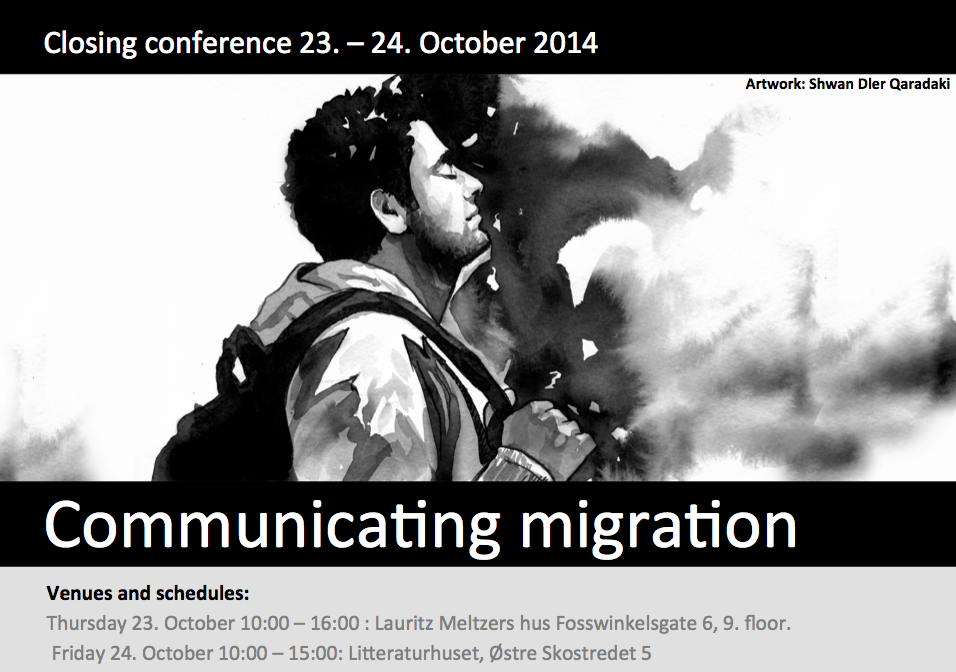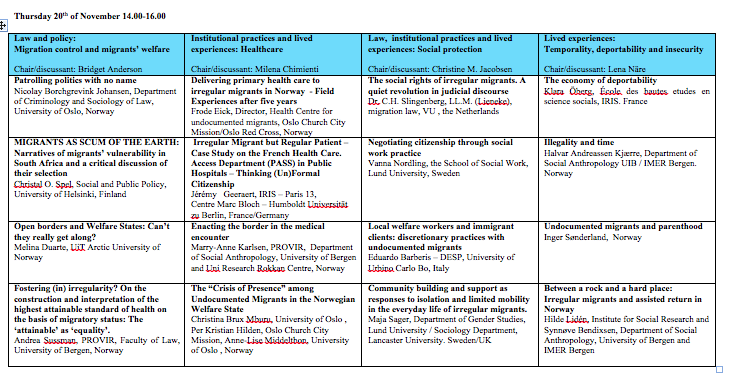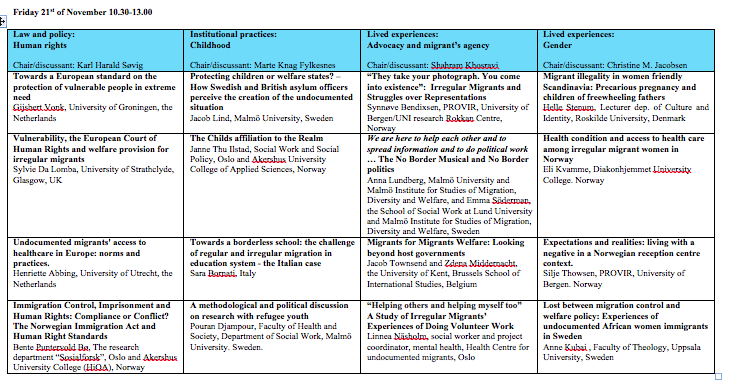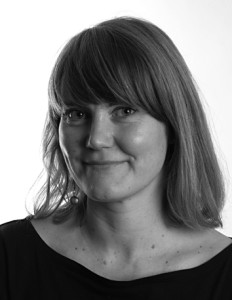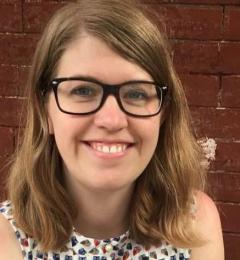The conference is open: No registration
The IMER seminar series for 2014 have covered how migration and ethnic relations are communicated in every-day encounters, in mass and social media, in art, in politics and in research and teaching at the universities. Has the way people talk about migration and migrants in different social contexts changed over time, and in which ways has it changed?
How does migration theory and research relate to other topics and theories in the social sciences, and how do results from migration research inform public debate and policy development? What are the challenges we encounter in communicating migration?
Thursday October 23. 2014
Lauritz Meltzers hus Fosswinkelsgate 6, 9. floor. (in English)
10.00 : Teaching race, Racism and Ethnicity: Education, politics and practice John Solomos
11.00: Studying race and discrimination in a colorblind society: the case of France Patrick Simon
12.00-13.00 Lunch
13.00: Migration and Integration in Norwegian Sociology Mette Andersson
13.30: Distinction Home and Abroad in Migration Research Tor Aase
14.00: Migration and Social Theory Randi Gressgård
14.30: Migration in Literature Studies Lene Johannessen
15.00:Migration in Political Science Hakan G. Sicakkan
15.30: Concluding Discussion
Friday October 24. 2014
Literature house Bergen, Østre skostredet 5, 2nd floor (in Norwegian)
10:00 – 10:15 Velkommen IMER leader Synnøve Bendixsen
10:15 – 10:40 IMDI: Fakta om innvandring til Norge v/ regionsdirektør Bente Blytt
10:45 – 12:00 Norsk-svensk innvandringskrangel– hva handlet den om, og hvor står debatten i dag? v/ Tidl. Statssekretær Ketil Rakes (N) og forfatter Henrik Arnstad (S)
12:00 – 13:00 Pause
13:00 – Å kommunisere migrasjon gjennom film og kunst. Diskusjon med kunstnerne Thomas Østbye og Shwan Dler Qaradaki sammen med antropolog Marry-Anne Karlsen.
14.00 Utstilling og film: Imaging Immanuel (2011. Regissør: Thomas Østbye. 52 min)
IMER Bergen, International Migration and Ethnic Relations, is a multidisciplinary research unit at Uni Research Rokkansenteret and the University of Bergen. The aim of IMER Bergen is to contribute to research-based knowledge about international migration, not least related to European countries, including the consequences of immigration and emigration for societies. IMER Bergen started as a unit at the University of Bergen in 1996, and has since then been an important contributor, both nationally and internationally, to the migration research field. IMER is a prioritized research area at the Faculty of Social Sciences, University of Bergen.
IMER online: http://imer.w.uib.no
Visit IMER on Facebook
For contact, please send email to imer@uni.no
Additional information:
A short introduction to the debate on Friday:
http://www.vg.no/nyheter/meninger/sverige/kronikk-folkhemspopulismen/a/23297613/
Om diskusjonene om migrasjon i kunst og film:
IMER Bergen har som en del av Communicating Migration konferansen invitert to kunstnere til å snakke om sitt arbeid. Begge kunstnerne jobber med migrasjon som tema og i samtalen vil vi ta opp spørsmål som: Hvordan kan migrasjon kommuniseres gjennom kunsten? Hva er forholdet mellom politikk og kunst? Er det likheter mellom kunst og samfunnsfagene? Hvilke dilemmaer star man ovenfor når man representerer andre mennesker gjennom kunst, og hvordan kan man løse slike dilemma. Kan kunsten gi mennesker en stemme?
I foredraget vil antropolog Mary-Anne Karlsen snakke med kunstnerne Thomas Østbye og Shwan Dler Qaradaki.
Thomas Østby, kjent for å ha laget den prisbelønte filmen Imaging Emanuel som vi vises etter samtalen. Østby har også en rekke andre arbeider som har fått anerkjennelse både nasjonalt og internasjonalt. Les mer: http://www.plymserafin.com
Shwan Dler Qaradaki levde i mange som papirløs i Norge selv. Dette har preget hans kunstneriske uttrykk der han er opptatt av tematikk som flukt, konflikt, identitet, tilhørighet og mangfold. Les mer: http://dlerqaradaki.tumblr.com/
Film: Imaging Emanuel
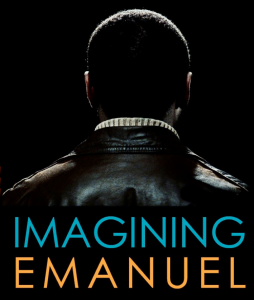 Emanuel har ukjent identitet og oppholder seg illegalt i Norge. Han kom til landet i 2003, men ønsker ikke å leve som illegal, og har forsøkt å få returnere til sitt hjemland uten hell. Han hevder å komme fra Liberia, men norske myndigheter hevder derimot at Emanuel kommer fra Ghana, og har tvangssendt ham dit to ganger. Hver gang har Ghana returnert ham til Norge med beskjed om at han ikke er Ghaneser. Emanuel er dermed dømt til et liv i limbo, uten oppholdstillatelse og rettigheter, men også uten utreisemulighet. Thomas Østbye tilnærmer seg Emanuel ved hjelp av en rekke forskjellige dokumentarsjangere, og de forskjellige avbildningene gir oss ulike inntrykk av den samme mannen. Hvem er Emanuel? Hva er identitet? Hvordan kan identitet avbildes? Hvem besitter sannheten?
Emanuel har ukjent identitet og oppholder seg illegalt i Norge. Han kom til landet i 2003, men ønsker ikke å leve som illegal, og har forsøkt å få returnere til sitt hjemland uten hell. Han hevder å komme fra Liberia, men norske myndigheter hevder derimot at Emanuel kommer fra Ghana, og har tvangssendt ham dit to ganger. Hver gang har Ghana returnert ham til Norge med beskjed om at han ikke er Ghaneser. Emanuel er dermed dømt til et liv i limbo, uten oppholdstillatelse og rettigheter, men også uten utreisemulighet. Thomas Østbye tilnærmer seg Emanuel ved hjelp av en rekke forskjellige dokumentarsjangere, og de forskjellige avbildningene gir oss ulike inntrykk av den samme mannen. Hvem er Emanuel? Hva er identitet? Hvordan kan identitet avbildes? Hvem besitter sannheten?
PROVIR closing conference: “Exceptional welfare: Dilemmas in/of irregular migration”
Wednesday 19th of November
Venue: Det Akademiske Kvarter
18.00-19.30: Letter to the king
Film by Hisham Zaman
Letter to the King portrays five people on a day trip from a refugee camp to Oslo, a welcome change in an otherwise monotonous life. But we soon realize that each and every one of them has an agenda for their trip. All five will make decisive choices on this day, as they discover happiness, humiliation, love or fulfill a long-awaited revenge. The five stories are tied together by a letter, written by eighty-three year old Mirza. Mirza wants to hand over the letter to the King personally.
19.30-21.00: Mediating irregular migration
Researchers, artists, authors, journalists and others contribute to the proliferation of images of the lives, and deaths, of those who migrate without proper authorization from the state. While stereotypical accounts of victims/criminals proliferate in mainstream media – (counter) representations that challenge such stereotyping also exist. The speakers in this panel discussion have all participated in producing and/or analysing images of irregular migration. Taking as their point of departure the film “Letter to the King”, they will discuss the poetics and politics of mediating irregular migration. What (im)possibilities does such mediation offer for current border struggles?
Plenary panel discussion with:
Mehmet Aktas, co-producer and scriptwriter, Letter to the king
Shahram Khosravi, Associate Professor of Social Anthropology, University of Stockholm
Synnøve N. Bendixsen, Post-doctoral fellow PROVIR and Department of Social Anthropology, University of Bergen
Film and panel discussion organized in cooperation with Studentersamfunnet i Bergen (http://samfunnet.sib.no/)
Thursday 20th of November
Venue: Faculty of Law, Magnus Lagabøtes plass 1, University of Bergen
09.30-10.00: Tea, coffee and registrations
10.00-10.15: Welcome address
10.15-11.45: Precarious inclusion: Provision of welfare to irregular migrants in Norway
Presentation of PROVIR research findings by
Christine M. Jacobsen, Karl Harald Søvig, Synnøve Bendixsen, Andrea Sussman and Marry-Anne Karlsen
11.45-12.00: Coffee break
12.00-13.00: Care Beyond Welfare?
Key note lecture by Miriam Ticktin, Associate Professor of Anthropology, The New School for Social Research and Eugene Lang College (US)
13.00-14.00: Lunch
14.00-16.00: Workshops
16.00-16.15: Coffee break
16.15-17.15: Wrongs, Rights and Regularization
Key note lecture by Linda Bosniak, Distinguished Professor of Law, Rutgers School of Law–Camden (US)
19.00: Conference dinner
Nøsteboden
Friday 21st of November
Venue: Faculty of Law, Magnus Lagabøtes plass 1, University of Bergen
09.15-10.15: Limiting Health Care as a Tool of Immigration Policy: Ethnographic Insights into Deservingness and Responses by Civil Society
Key note lecture by Heide Castañeda, Associate Professor and Graduate Director, Department of Anthropology, University of South Florida (US)
10.15-10.30: Coffee break
10.30-12.30: Workshops
12.30-13.30: Lunch
13.30-15.30: Excepted, excluded or precariously included? Dilemmas in/of irregular migration
Roundtable discussion by PROVIR research team and international partners:
Bridget Anderson, Professor of Migration and Citizenship and Deputy Director of Centre on Migration, Policy and Society (COMPAS), University of Oxford (UK)
Milena Chimienti, Professor, University of Applied Science Western Switzerland – Social Work, Haute Ecole Fribourgeoise de Travail Social (HETS) (Switzerland)
Henriette Abbing, (Emiratus) Professor of Health Law, University of Utrecht (the Netherlands)
Christine M. Jacobsen, Professor, PROVIR project leader and Director of Center for Women’s and Gender Research (SKOK), University of Bergen (Norway)
Karl Harald Søvig, Professor, Faculty of Law, University of Bergen (Norway)
Workshop Porgram:
Download workshop program here
Film and panel discussion on the dilemmas of mediating irregular migration
Wednesday 19th of November
Venue: Tegleverket, Det Akademiske Kvarter, Bergen
18.00-19.30: Letter to the king
Film by Hisham Zaman
Letter to the King portrays five people on a day trip from a refugee camp to Oslo, a welcome change in an otherwise monotonous life. But we soon realize that each and every one of them has an agenda for their trip. All five will make decisive choices on this day, as they discover happiness, humiliation, love or fulfill a long-awaited revenge. The five stories are tied together by a letter, written by eighty-three year old Mirza. Mirza wants to hand over the letter to the King personally.
19.30-21.00: Mediating irregular migration
Researchers, artists, authors, journalists and others contribute to the proliferation of images of the lives, and deaths, of those who migrate without proper authorization from the state. While stereotypical accounts of victims/criminals proliferate in mainstream media – (counter) representations that challenge such stereotyping also exist. The speakers in this panel discussion have all participated in producing and/or analysing images of irregular migration. Taking as their point of departure the film “Letter to the King”, they will discuss the poetics and politics of mediating irregular migration. What (im)possibilities does such mediation offer for current border struggles?
Plenary panel discussion with:
Mehmet Aktas, co-producer and scriptwriter, Letter to the king
Shahram Khosravi, Associate Professor of Social Anthropology, University of Stockholm
Synnøve N. Bendixsen, Post-doctoral fellow PROVIR and Department of Social Anthropology, University of Bergen
Film and panel discussion is organized by IMER Bergen in cooperation with Studentersamfunnet i Bergen (http://samfunnet.sib.no/) and is part of the PROVIR-project’s closing conference.
Precarious inclusion: Provision of welfare to irregular migrants in Norway
The IMER Bergen-project Provision of welfare to irregular migrants (PROVIR) will present its research findings at this open event.
PROVIR combined legal and anthropological approaches to investigate the complex relationship between law, institutional practice, and irregular migrants’ lived experience. The research project aimed to cast light on living conditions and access to welfare of irregularized migrants.
You can find more information about the project at PROVIRs website: http://rokkan.uni.no/sites/provir/
Date: November 20th
Time: 10.00 to 11.45
Venue: Auditorium 4, Faculty of Law, University of Bergen
Mistillitens migrasjon: Europeisk sør-nord mobilitet i kjølvannet av krisa
Tema for innlegget er den nye Europeiske sør-nord migrasjonen. Den empiriske analysen er basert på dybdeintervjuer med noen av dem som har reist fra Spania til Norge etter kriseåret 2008. Innlegget vil belyse hvordan sør-nord migrasjonen i kjølvannet av krisa er mer enn en desperat flukt fra arbeidsledighet i hjemlandet. Den vidtrekkende mistilliten til det politiske systemet og følelsen av en dyptgripende håpløshet i hjemlandet er viktige migrasjonsfaktorer i tillegg til jobbmuligheter for dem som kommer til Norge.
Susanne Bygnes (phd) er postdoktor ved universitetet i Bergen. Hun leder det fireårige prosjektet Labour Migration in Uncertain Times: Migration from Spain to Norway after 2008, finansiert av forskningsrådets VAM-program. Hun har publisert en rekke internasjonale artikler på tema som mangfold og likestilling, blant annet Ambivalent Multiculturalism (2012) i tidsskriftet Sociology.
IMER Lunch: Astrid Ouahyb Sundsbø – Social mixing policies: What You Want and What You Get
In the public debate and contemporary social policies in Norway as well as in other countries, concentrations of “immigrants” in certain areas of a city are considered to be unfortunate and something which needs to be fought against (see i.e. Gakkestad 2003; Akerhaug 2012). It is anticipated that spatial concentrations of “immigrants” enforces the social isolation of “immigrants” and triggers criminal activities, among other aspects. This becomes very obvious when a “high percentage of immigrants” in an area serves as basis for referring to that area as a “ghetto” or “insecure” (see i.e. Sæter 2005; Vassenden: 2007; cf. Akerhaug 2012).
In this lunch seminar, the idea of social mixing, which is not just common in the general public debate but also a manifested major urban policy and planning goal (Sæter & Ruud 2005; Huse, Sæter & Aniksdal 2010; cf. Musterd 2005) will be discussed. By using some illustrations both from the academic debate as well as own empirical work, it is shown that it is necessary to be critical about this concept.
It is referred to literature arguing that there is a lack of empirical evidence showing that the residential segregation of “immigrants” has any effect at all, for instance on “integration” and crime (for instance Musterd 2005; Galster 2007; Lees 2008). Furthermore, it is discussed that the imagination of social mixing as an ideal way to tackle the “multicultural challenge” might be founded on a highly problematic understanding of “immigrants“ and their norms and values as inherently “bad” (cf. Eriksen 1996: 51). This is shown by drawing on statements from interviews with members from the majority population residing in Oslo.
Astrid Ouahyb Sundsbø
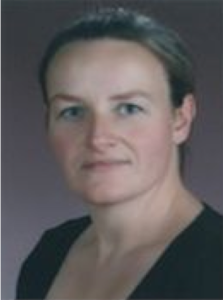 Astrid Ouahyb Sundsbø (PhD) is a postdoctoral research fellow at the Georg-Simmel Center for Metropolitan Studies in Berlin. She holds a doctoral degree in sociology from the Humboldt-University of Berlin (2012). From 2012-2014 she worked as a postdoctoral researcher at the Center for a Sustainable University at the University of Hamburg. Her main fields of research compromise: Social inequality, residential segregation in cities, migration and interethnic relations. Her most recent publication is Grenzziehungen in der Stadt. Ethnische Kategorien und die Wahrnehmung und Bewertung von Wohnorten (Springer VS, 2014) where it is discussed whether ethnic boundary making on the side of the majority population could be a possible explanation for the residential concentration of immigrants in Berlin and Oslo.
Astrid Ouahyb Sundsbø (PhD) is a postdoctoral research fellow at the Georg-Simmel Center for Metropolitan Studies in Berlin. She holds a doctoral degree in sociology from the Humboldt-University of Berlin (2012). From 2012-2014 she worked as a postdoctoral researcher at the Center for a Sustainable University at the University of Hamburg. Her main fields of research compromise: Social inequality, residential segregation in cities, migration and interethnic relations. Her most recent publication is Grenzziehungen in der Stadt. Ethnische Kategorien und die Wahrnehmung und Bewertung von Wohnorten (Springer VS, 2014) where it is discussed whether ethnic boundary making on the side of the majority population could be a possible explanation for the residential concentration of immigrants in Berlin and Oslo.
Redigert av Christine Jacobsen, Synnøve Bendixsen, Karl Harald Søvig
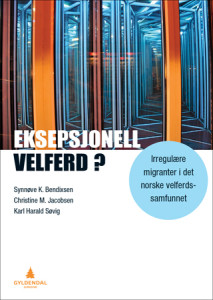 Irregulære immigranter har på noen områder full tilgang til velferdsytelser, men på mange områder er tilgangen svært begrenset enten i form av rettsregler eller andre barrierer. Denne antologien undersøker forholdet mellom rettslig rammeverk, institusjonell praksis og hvordan irregulære migranter selv erfarer sin situasjon.
Irregulære immigranter har på noen områder full tilgang til velferdsytelser, men på mange områder er tilgangen svært begrenset enten i form av rettsregler eller andre barrierer. Denne antologien undersøker forholdet mellom rettslig rammeverk, institusjonell praksis og hvordan irregulære migranter selv erfarer sin situasjon. Med en unik kombinasjon av juridisk og antropologisk blikk, går boken regelverket nærmere i sømmene, drøfter gatebyråkraters utfordringer og hverdagslivet til irregulære migranter og deres barn.
Hvilke regelverk får konsekvenser for irregulære migranters levevilkår? Hvordan blir dette regelverket forstått og etterfulgt av gatebyråkrater? Og hvordan blir hverdagslivet til irregulære migranter og deres barn påvirket av regelverket og dets fortolkning?
Denne boken er aktuell for velferdsprofesjoner som møter irregulære migranter som en del av sin yrkesutøvelse. Både leger, sykepleiere, helsesekretærer, lærere, helsesøstre, skolerådgivere, sosialarbeidere, sosionomer og barnevernspedagoger vil ha god nytte av Eksepsjonell velferd? Irregulære migranter i det norske velferdssamfunnet. Boken retter seg også mot frivillige organisasjoner som jobber med ulike aspekter ved migranters situasjon i Norge og andre som er engasjert i temaet.
The populist radical right has emerged as the spearhead of a larger renationalization process directed against positions of global and European integration. Based on anthropological fieldwork in the postindustrial towns of Doncaster (South Yorkshire, UK) and the Hungarian town of Ózd in 2015, the paper examines the various historical, material and socio-economic factors in the rise of Ukip (United Kindom Independence Party) and the extreme right-wing Jobbik (Movement for a Better Future).
In their politics of fear, minorities and migrants are marked as posing cultural-religious threats to communal harmony and the nation-state. Through participant observation and interviews with Ukip and Jobbik politicians and supporters, the paper examines how knowledge about ‘threatening others’ is produced, circulated and contested.
 Dr. Cathrine Thorleifsson holds a PhD in Social Anthropology from the London School of Economics and Political Science (2012). Her chief theoretical interests lie in anthropological approaches to the study of nationalism, migration, borders and xenophobia.
Dr. Cathrine Thorleifsson holds a PhD in Social Anthropology from the London School of Economics and Political Science (2012). Her chief theoretical interests lie in anthropological approaches to the study of nationalism, migration, borders and xenophobia.
Welcome! A light lunch will be served.
About the Seminar series:
Migration responses
Debating the current refugee crisis in Europe
The IMER Bergen Seminar series for the spring of 2016 will discuss a wide range of responses in the wake of the current migration crisis. How can the theoretical and empirical research currently being conducted on migration, ethnic relations, peace and conflict contribute to understanding the multi-faceted landscape of politics, boundaries and everyday lives of the refugee crisis?
Illustration: Wallpapercave
Hip hop music and the forging of civic bonds among minority youth in Norway
A vast body of research documents that media coverage of ethnic minorities in Norway is systematically imbalanced and problem oriented, which in turn engenders a sense of exclusion. At the same time, hip hop music and artists are today regular fixtures in various media formats, and a genre that comprises a number of prominent performers of multi-cultural background.
Set against the backdrop of the exclusionary effects of news media representations, this interview study of a group of minority youth makes evident that mass mediated hip hop music is for them taken to entail public representation of minority experiences and sensibilities that engender a sense of democratic inclusion.
By combining recognition theory and reception theory, Nærland shows how hip hop-related media coverage is experienced to involve a positive affirmation of minority identity that also contributes to the formation of civic identity and affinities. The study argues that musical media events constitute ‘moments of recognition’ where dynamics of recognition is intensified.
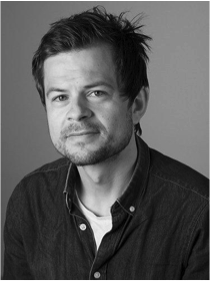 Nærland further argues that recognition theory makes up a valuable supplementary framework for our theoretical understanding of the civic dimensions of media reception, and the role of popular music therein.
Nærland further argues that recognition theory makes up a valuable supplementary framework for our theoretical understanding of the civic dimensions of media reception, and the role of popular music therein.
Welcome! A light lunch will be served.
About the Seminar series:
Migration responses
Debating the current refugee crisis in Europe
The IMER Bergen Seminar series for the spring of 2016 will discuss a wide range of responses in the wake of the current migration crisis. How can the theoretical and empirical research currently being conducted on migration, ethnic relations, peace and conflict contribute to understanding the multi-faceted landscape of politics, boundaries and everyday lives of the refugee crisis?
If a LGBTI person can “stay in the closet” in the country of origin, should she then be denied asylum as a refugee? This is currently a thorny issue for several European countries, when facing asylum seekers who apply for protection on the basis of their sexual orientation or gender identity. For this IMER seminar, Andrea Grønningsæter from the faculty of law at UiB will discuss how this is currently practiced in Norway.
Research has shown that that LGBTI people (lesbian, gay, bisexual, trans and intersex people) often face specific legal and procedural challenges when applying for refugee status. In a number of jurisdictions, including Norway, LGBTI asylum seekers have been denied refugee status with reference to the fact that they can abstain from behavior that may result in a risk of persecution. A gay person can live as a gay within the confines of the home, for example, but not on the streets – and may thus not be granted protection. It is then concluded that the requirement in refugee law of establishing a ‘well-founded fear’ of persecution is not fulfilled, because concealment will mean that the asylum seeker is not revealed to potential persecutors.
In 2012 the Norwegian Supreme Court considered the right to refugee status based on sexual orientation (Rt. 2012 s. 494). In the court’s decision it was stated that a gay person may not be required to hide their sexual orientation in the country of origin to avoid persecution. In cases where it is concluded that the asylum seeker will choose to conceal their sexual orientation, the court established a step-by-step approach for assessing whether the asylum seeker is entitled to refugee status.
For her PhD project, Grønningsæter looks at how the approach that was established by the Supreme Court in 2012 for assessing asylum cases based on sexual orientation or gender identity is interpreted by the courts and the immigration authorities. She explores how the courts and immigration authorities establish the asylum seeker’s reason for concealment, as well as how concepts such as ‘being open’ or ‘discreet’ about sexual orientation or gender identity is understood.
A light lunch will be served. Welcome!
Andrea Grønningsæter is a PhD candidate at the Faculty of Law, Bergen University.

